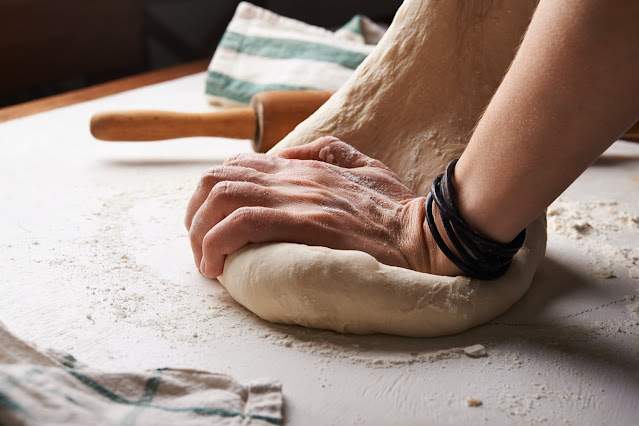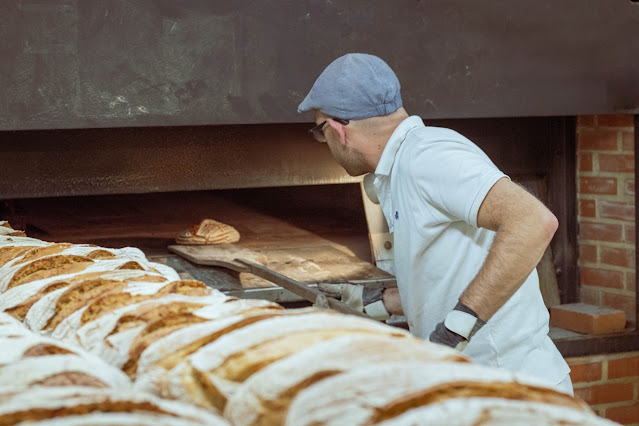A Piece of Cake: 5 Easy Ways to Start a Career
as a Baker
Contrary to popular
misconceptions, the baker profession is quite versatile and diverse. It is one
of the oldest trades, going back several millennia. It is part profession, part
skill and part art – a successful baker is as much an artist as he (or she) is
a craftsman (or craftswoman). Being a professional baker involves quite a lot
of challenges and hard work, but it can bring great satisfaction too. After
all, your products will bring people joy and will be associated with great
times and wonderful memories.
Nowadays, there are
numerous directions that a baker’s career can go – baking operative, artisan
baker, craft baker, industrial baker, baking business owner, you name it. Even
if you start work at a
biscuit factory at first, with the right training and experience, you can eventually
become a production manager. In the modern restaurant and food industries,
there are countless settings where a baker’s skills and know-how are needed and
valued.
But how does one go
about starting a career as a baker? And furthermore, what are the best ways to
enter the trade and start gaining experience and developing as a professional?
Assuming you have already completed at least some secondary education, here are
several ways, with tips and recommendations:
Photo by Nadya Spetnitskaya on Unsplash
1. Work Towards the
Role
While this seems like a no-brainer, it arguably involves the most persistence
and hard work. You can easily find a job at a place that involves baking to a certain
degree – a specialized shop, supermarket, or food production plant. The
advantage is that you need no prior education or training, even a high school
diploma is not mandatory in many places. You are sure to get the basic training
from your employer, free of charge.
However, this approach has numerous setbacks. Firstly, you will learn
all there is to learn rather quickly, as these roles usually involve a limited
amount of knowledge and skills. Second, all the operations will be fairly
simple and repetitive, which means you will get bored, sooner rather than
later. And thirdly, there are very few opportunities to get a promotion and
advance your career towards your final goal, potentially turning this path into
a dead end.
2. Take a Baker
Apprenticeship
While working at a store or supermarket will earn you very basic baking
skills, opting for a baker apprenticeship with an artisan bakery or cake shop
will teach more complicated stuff, like baking techniques and how to bake
cakes. But greater rewards also imply greater commitment – an apprenticeship
usually takes one to three years to complete. Furthermore, there are some entry
requirements as well. For an intermediate apprenticeship, you will need some
GCSEs, usually including English and Maths. For and advanced apprenticeship,
you will need 5 GCSEs at grades 9 to 4
(A* to C), or equivalent, including English and Maths.
This path can lead you towards becoming a baker’s assistant, and
eventually a full-fledged baker.
3. Enrol to a
Technical or Cooking School
If you decide to take your game to another level, you can invest in a
program at a technical or cooking school. These programs will teach you both
the skills and the science behind the craft, including cooking techniques,
nutrition, recipe calculations, kitchen management and even chemistry. Plus,
your new education will probably help you find your niche in the baking
business and become specialized in it, which will eventually let you earn more
while doing what you love best.
A program usually lasts between one and two years. Admission
requirements are 5 GCSEs at grades 9 to 4
(A* to C), or equivalent, including English and Maths. Please be aware that there is always a course fee
involved.
4. Take a College
Course
This path involves even more commitment than the previous one, both
financially and timewise. But a college course will also open up a lot more
opportunities for your long-term career, by giving you more knowledge and also
helping you access upper-tier employers and jobs. Relevant college courses
include Bakery (Level 2), Hospitality and Catering (Level 2), as well as
Professional Bakery (Level 3). You will need 2 or more GCSEs at grades 9 to 3 (A* to D) for a Level 2 course, and 4 or 5 GCSEs at grades 9 to 4 (A* to C) for a Level 3 course.
Photo by DDP on Unsplash
5. Get Certified
Regardless of your level of formal education, the most prestigious
professional recognition for a baker, is to get certified. This is in no way
mandatory, but it will showcase your skillset and knowledge to the whole world,
being recognized throughout the industry
as a standard for excellence. Plus, it will help you gain more self-confidence and
creative freedom. There are several levels of certification, each with its own
set of requirements:
· Certified Journey Baker (CJB) – requires a
minimum of one year of verifiable commercial baking experience, or a minimum of
one year combination of education and commercial baking work experience, of which at least one thousand hours must be work experience. It involves passing
a written test with a score of at least 75 percent.
· Certified Baker (CB) – requires completion of a 30-hour sanitation course, as well as a minimum of four years of verifiable full-time
commercial baking experience, or a CJB plus
three years of baking experience. Besides the written test, there is also a
one-day practical test.
· Certified Master Baker (CMB) – requires you to
have achieved the CB certification, plus an
additional three years of verifiable full-time commercial baking experience, as well as a total of 30 contact hours of professional
development courses in supervision or bakery management and production. Again, you need to
pass both a written and a practical test.















All good tips that I never thought of. Here in Michigan you can be a home baker with no certification and still sell at farm markets and such. But I think you have to put a notice on your label saying "This was baked in a home kitchen not certified by the state."
ReplyDeleteThanks Jeanie! I agree with you, things should be marked accordingly! xoxo
Delete